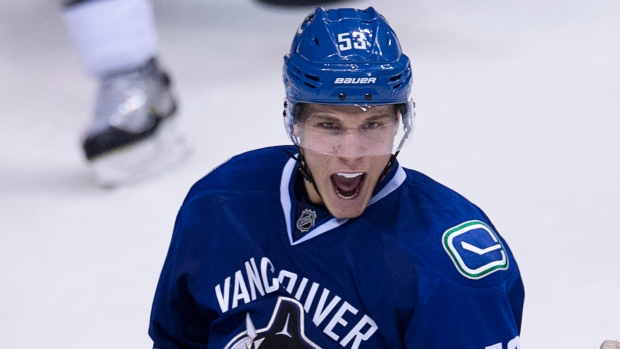Bo Horvat: How Good Can He Be?
When the Canucks surprisingly decided to keep Roberto Luongo and trade Cory Schneider, they obtained the 9th overall pick of the 2013 draft. For a goaltender of Schneider’s caliber, it seemed as though the return should have been significantly higher. Then GM Mike Gillis all but confirmed that he had received a stronger offer from the division rival Edmonton Oilers. Gillis turned the deal down saying that he simply could not fathom having to play multiple division games against Schneider for the next decade and a half.
The Canucks had a choice to make with pick 9. They could pick enigmatic but supremely talented Russian Valeri Nichushkin, who was drawing comparisons to Evgeni Malkin for his combination of size, speed, and strength – the type of player that could change the dynamic of a game with one rush. Or they could pick the soft-spoken two-way Canadian centreman, Bo Horvat, who excelled at both ends of the ice. His offensive numbers didn’t blow anybody away, but he was a proven winner and someone who played for the team and not for himself.
In hindsight, the Canucks seem to have made the right decision. It would surprise no one if Nichushkin ended up being one of the top ten best players in the NHL someday. It would also surprise no one if Horvat was named team captain when Henrik Sedin retires and if he won multiple Selke Trophies over the next decade. Bo Horvat is exactly the type of player the Canucks needed at exactly the right time.
Horvat spent the first year after being drafted in the OHL with the London Knights. As an 18 year-old, he put up 74 points in 54 games while playing in all situations for Dale Hunter’s Knights. He put his defensive game first – he clearly enjoyed putting up points and scoring goals, but he took most pride in shutting down the other team’s top players.
After honing his craft for a year Horvat unexpectedly made the Canucks roster out of training camp as a 19 year-old. Most were expecting an additional year of seasoning for Horvat, a potential captain for the Canadian World Junior entry. Everyone seemed surprised – everyone except for Bo Horvat. When he was sent down as an 18-year-old, Horvat was clearly disappointed and he vowed to himself that he would not let it happen again. He worked hard. He continued to improve his two-way game. He improved his faceoff ability. He shot the puck more. He improved his offensive numbers.
Life in the NHL
At the beginning of the 2014 season, the 19 year-old Horvat didn’t see much ice-time, averaging less than 10 minutes a game. He seemed timid. He seemed like he was trying not to mess up. He was trying too hard to earn more than a nine-game cup of coffee in the NHL. Everything changed around mid-November.
After a film session, with the whole team present, video here, Coach Willie Desjardins addressed Bo. During the session, he’d shown Bo two clips. One of him losing track of his man leading to a scoring chance, the other of him going hard to the net and scoring a goal. “Are you the guy that didn’t go out and track?” implored Desjardins, “or are you the guy that went to the net to score?” Sheepishly Horvat answered, “I’m the guy that went to the net to score.” “Then welcome to the NHL” Desjardins smirked.
Once Horvat knew he was in the NHL for good, the switch seemed to flip on for him. He stopped trying to make the cautious play. He stopped trying not to mess up. He started to be aggressive. He started to try to create offense. Plenty of mistakes were still made by the youngster, but he was given the freedom to try to make those plays, as they were and are plays that Horvat is capable of making.
Fast forward to round one of the NHL playoffs. The 19 year-old completed his rookie regular season with 25 points in 68 games and 20 points in his last 30 games. Horvat was counted on to take critical faceoffs at critical points in games and played a regular shift. He finished the playoffs with four points in six games while averaging about 13 minutes of ice time per game. Not bad for a kid who turned 20 just before the playoffs.
Future Outlook
So what’s next? The sky is seemingly the limit for Horvat. Some compare his game to Jonathan Toews’, others compare him to David Backes. If Horvat ends up anywhere near those two players, the Canucks would be thrilled. Both are captains of their respective organizations and pride themselves on playing defense first and offense second. Horvat’s ceiling probably lands somewhere between those two. A strong number one center who excels at faceoffs and probably wins the Selke trophy for best defensive forward multiple times while scoring 60-65 points. Worst case scenario Horvat is a defensively sound third line center who anchors the team’s PK unit. It looks as though Horvat is on track for the former as he continues to make that seemingly ridiculous trade look better by the day.




Leave a Comment